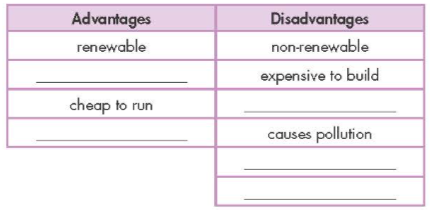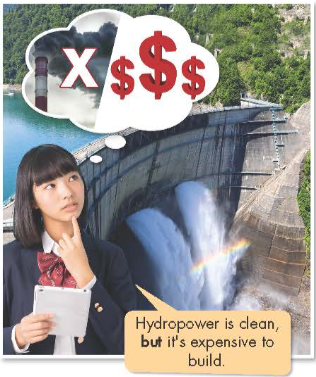Tiếng Anh 7 Unit 10 Lesson 2a. Match the words with the pictures. b. Add each word/phrase (5–9) to the correct column. Listen and repeat. c. In pairs: Discuss which energies you think are clean to run or cause pollution.a. Read the text and underline the correct title. b. Now, read and answer the questions.c. In pairs: Which of the energy sources is the best choice for the future of your country?a. Listen and repeat.b. Write sentences using the prompts.c. Fill in the blanks using “and or , but”.d. In pairs: Make sentences GÓP Ý HAY - NHẬN NGAY QUÀ CHẤT Gửi góp ý cho HocTot.Nam.Name.Vn và nhận về những phần quà hấp dẫn
Lựa chọn câu để xem lời giải nhanh hơn
New Words a a. Match the words with the pictures. (Nối từ với bức tranh tương ứng.)
Lời giải chi tiết:
1 - C. power plant (nhà máy điện) 2 - A. wind turbine (tua bin gió) 3 - B. solar panel (tấm pin năng lượng mặt trời) 4 - D. nuclear power (năng lượng hạt nhân) New Words b b. Add each word/phrase (5–9) to the correct column. Listen and repeat. (Thêm từng từ /cụm từ (5–9) vào đúng cột. Lắng nghe và lặp lại.)
Lời giải chi tiết:
New Words c c. In pairs: Discuss which energies you think are clean to run or cause pollution. (Theo cặp: Thảo luận về năng lượng nào bạn nghĩ là sạch để tiến hành hoặc gây ô nhiễm.) I think coal causes pollution. (Tôi nghĩ than đá gây ô nhiễm.) I think solar power is clean to run. (Tôi nghĩ năng lượng mặt trời vận hành không gây ô nhiễm.) Lời giải chi tiết: I think wind power is clean to run. (Tôi nghĩ rằng năng lượng gió sạch để vận hành.) I think natural gas causes pollution. (Tôi nghĩ khí đốt tự nhiên gây ô nhiễm.) Reading a a. Read the text and underline the correct title. (Đọc văn bản và gạch chân chủ đề đúng.) 1. The Advantages of Clean Energy Sources (Lợi ích của năng lượng sạch) 2. Comparing Different Energy Sources (So sánh các nguồn năng lượng khác nhau) Choosing the best option for energy can be difficult. Coal power is the most popular form of energy today because coal plants aren't expensive to build. However, they can produce a lot of pollution. Other non-renewable energy sources, like natural gas, are cleaner than coal, but they still aren't good for the environment. Countries are now moving to renewable sources of energy like wind, solar, and hydroelectric power. Wind and solar power plants are clean and cheap to run, but they aren't cheap to build. Also, wind turbines are noisy and need windy weather to work well, and solar power doesn't work at night. Hydroelectric plants also don't cause pollution, but they can be expensive to build and affect the environment by stopping fish from moving freely. For these reasons, countries and cities usually choose a mix of energy types. Phương pháp giải: Tạm dịch: Lựa chọn tốt nhất cho năng lượng có thể khó khăn. Năng lượng từ than đá là dạng năng lượng phổ biến nhất hiện nay vì các nhà máy than không tốn kém để xây dựng. Các nguồn năng lượng không tái tạo khác như khí đốt tự nhiên, sạch hơn than đá, nhưng chúng vẫn không tốt cho môi trường. Các quốc gia hiện đang chuyển sang các nguồn năng lượng tái tạo như gió, mặt trời và thủy điện. Các nhà máy điện gió và năng lượng mặt trời sạch sẽ và rẻ để chạy, nhưng chúng không rẻ để xây dựng. Các nhà máy thủy điện cũng không gây ô nhiễm, nhưng chúng có thể tốn kém để xây dựng và ảnh hưởng đến môi trường bằng cách ngăn cá di chuyển tự do. Vì những lý do này, các quốc gia và thành phố thường chọn kết hợp các loại năng lượng. Lời giải chi tiết: Chọn chủ đề 2 Comparing Different Energy Sources (So sánh các nguồn năng lượng khác nhau) Giải thích: Đoạn văn đi so sánh lợi ích và bất lợi của một số nguồn năng lượng khác nhau. Reading b b. Now, read and answer the questions. (Bây giờ, đọc và trả lời câu hỏi.) 1. Why does the article say coal plants are common? (Tại sao đoạn văn nói rằng các nhà máy than là phổ biến?) 2. Why is natural gas better than coal? (Tại sao khí đốt tự nhiên tốt hơn than đá?) 3. What are two advantages of wind power plants ? (Hai ưu điểm của nhà máy điện gió là gì? ) 4. What is a disadvantage of solar power? (Bất lợi của năng lượng mặt trời là gì?) 5. What environmental problem does hydroelectric power create? (Thủy điện tạo ra vấn đề môi trường gì?) Lời giải chi tiết: 1. They are common because they aren't expensive to build. (Chúng phổ biến vì xây dựng không tốn kém.) Thông tin: Coal power is the most popular form of energy today because coal plants aren't expensive to build. 2. Because natural gas is cleaner than coal. (Vì khí đốt tự nhiên sạch hơn than đá.) Thông tin: Other non-renewable energy sources, like natural gas, are cleaner than coal, but they still aren't good for the environment. 3. Wind power plants are clean and cheap to run. (Nhà máy điện gió sạch và vận hành rẻ.) Thông tin: Wind and solar power plants are clean and cheap to run, but they aren't cheap to build. 4. Solar power doesn't work at night. (Năng lượng mặt trời không hoạt động vào ban đêm.) Thông tin: and solar power doesn't work at night 5. Hydroelectric plants stop fish from moving freely. (Nhà máy thủy điện ngăn cá di chuyển tự do.) Thông tin: Hydroelectric plants also don't cause pollution, but they can be expensive to build and affect the environment by stopping fish from moving freely. Reading c c. In pairs: Which of the energy sources is the best choice for the future of your country? (Theo cặp: Nguồn năng lượng nào là lựa chọn tốt nhất đối với đất nước bạn trong tương lai?) Lời giải chi tiết: A: Which of the energy sources is the best choice for the future of your country? (Nguồn năng lượng nào là lựa chọn tốt nhất đối với đất nước bạn trong tương lai?) B: I think solar energy is the best choice for the future of my country. (Tôi nghĩ năng lượng mặt trời là lựa chọn tốt nhất với nước tôi trong tương lai.) Grammar a a. Listen and repeat. (Nghe và lặp lại.)
Hydropower is clean and renewable, but it's expensive to build. (Thủy điện thì sạch và có thể tái tạo, nhưng nó tốn kém để xây dựng.) Grammar b b. Write sentences using the prompts. (Viết lại câu sử dụng gợi ý.) 1. Coal/cheap/easy/use Coal is cheap and easy to use. (Than đá thì rẻ và dễ sử dụng.) 2. Hydropower/clean/cheap 3. Wind power/clean/renewable/noisy 4. Natural gas/cheap/non-renewable 5. Motorbikes/popular/cheap/pollution 6. Microwave ovens/convenient/save money Lời giải chi tiết: 2. Hydropower is cheap and clean to use. (Than đá thì rẻ và sạch để sử dụng.) 3. Wind power is clean and renewable, but it’s noisy. (Năng lượng gió sạch và có thể tái tạo, nhưng nó ồn ào. ) 4. Natural gas is cheap, but it’s non-renewable. (Khí đốt tự nhiên rẻ, nhưng nó không thể tái tạo.) 5. Motorbikes are popular and cheap, but cause pollution. (Xe máy phổ biến và rẻ, nhưng gây ô nhiễm.) 6. Microwave ovens are convenient and save money. (Lò vi sóng rất tiện lợi và tiết kiệm tiền.) Grammar c c. Fill in the blanks using “and or , but”. (Điền vào chỗ trống sử dụng “and hoặc , but”.) 1. Electric cars are clean, but they are expensive to buy. (Ô tô điện thì sạch, nhưng đắt để mua.) 2. Nuclear power can sometimes be dangerous __________it's cheap to run. 3. Microwave ovens are cheap______ they use less electricity than electric ovens. 4. Solar panels save money_________ they are clean. 5. Coal power plants are popular______ cheap _______they cause pollution. 6. My hometown is noisy_________ polluted ________I love living there. Phương pháp giải: and: và but: nhưng Lời giải chi tiết:
2. Nuclear power can sometimes be dangerous, but it's cheap to run. (Năng lượng hạt nhân đôi khi có thể nguy hiểm, nhưng nó rẻ để vận hành.) 3. Microwave ovens are cheap and they use less electricity than electric ovens. (Lò vi sóng rẻ và tốn ít điện hơn lò nướng điện.) 4. Solar panels save money and they are clean. (Các tấm pin mặt trời tiết kiệm tiền và sạch sẽ.) 5. Coal power plants are popular and cheap, but they cause pollution. (Nhà máy điện than phổ biến, rẻ nhưng gây ô nhiễm.) 6. My hometown is noisy and polluted, but I love living there. (Quê hương tôi ồn ào và ô nhiễm, nhưng tôi thích sống ở đó.) Grammar d d. In pairs: Make sentences about different types of transportation. Use the prompts. (Theo cặp: Viết câu về phương tiện khác nhau sử dụng gợi ý.) airplanes/fast/convenient/pollution (máy bay/ nhanh/ thuận tiện/ ô nhiễm) cars/convenient/expensive (ô tô/ thuận tiện/ đắt) bicycles/clean/cheap/good for health (xe đạp/ sạch/ rẻ/ tốt cho sức khỏe) Lời giải chi tiết: Airplanes are fast and convenient, but it’s pollution. (Máy bay thì nhanh và thuận tiện, nhưng nó ô nhiễm.) Cars are convenient, but it’s expensive. (Ô tô thì thuận tiện, nhưng nó đắt.) Bicycles are clean, cheap and good for health. (Xe đạp thì sạch, rẻ và tốt cho sức khỏe.) Pronunciation a a. "...and..." often sounds like /n/. ("...and..." thường được phát âm giống /n/.) Pronunciation b b. Listen. Notice the sound changes of the underlined words. (Nghe. Chú ý sự thay đổi âm thanh của những chữ được gạch chân.) Solar power is clean and cheap. (Năng lượng mặt trời sạch và rẻ.) Cars are noisy and expensive. (Ô tô ồn và đắt.) Pronunciation c c. Listen and cross out the sentence that doesn't follow the note in "a." (Nghe và gạch bỏ câu không theo ghi chú ở phần a.) Coal is cheap and easy to use. (Than đá thì rẻ và dễ sử dụng.) Wind power is clean and cheap to use. (Năng lượng gió thì sạch và rẻ để sử dụng.) Lời giải chi tiết: Coal is cheap and eassy to use. => Sai vì không lược bỏ âm /d/ trong từ "and". Pronunciation d d. Read the sentences with the correct sound changes to a partner. (Đọc câu đúng với sự thay đổi phát âm cùng bạn của em.) Practice a a. Ask and answer. (Hỏi và trả lời.) Can you tell me about wind power? (Bạn có thể nói cho tôi về năng lượng gió được không?) It's clean and cheap to run, but it's expensive to build. It's also... (Nó thì sạch và rẻ để tiến hành nhưng nó đắt để xây dựng. Nó cũng...)
Lời giải chi tiết: A: Can you tell me about hydropower? (Bạn có thể nói cho tôi về năng lượng thủy điện được không?) B: It's clean and cheap to run, but it's expensive to build. It's also need big rivers. (Nó thì sạch và rẻ để tiến hành nhưng nó đắt để xây dựng. Nó cũng cần sông lớn.) A: Can you tell me about solar power? (Bạn có thể nói cho tôi về năng lượng mặt trời được không?) B: It's clean and cheap to run, but it's expensive to build. It doesn’t work at night. (Nó thì sạch và rẻ để tiến hành nhưng nó đắt để xây dựng. Nó cũng không hoạt động vào buổi tối.) A: Can you tell me about natural gas power? (Bạn có thể nói cho tôi về năng lượng gió được không?) B: It's cheap to build, but it's expensive to run. It also creates some pollution. (Nó thì rẻ để xây dựng nhưng nó đắt để tiến hành. Nó cũng gây nhiều ô nhiễm.) A: Can you tell me about coal power? (Bạn có thể nói cho tôi về năng lượng than được không?) B: It's cheap to build, but it's expensive to run. It also creates pollution. (Nó thì rẻ để xây dựng nhưng nó đắt để tiến hành. Nó cũng gây ô nhiễm.) A: Can you tell me about nuclear power? (Bạn có thể nói cho tôi về năng lượng hạt nhân được không?) B: It's clean and cheap to run, but it's expensive to build. It also dangerous. (Nó thì sạch và rẻ để tiến hành nhưng nó đắt để xây dựng. Nó cũng nguy hiểm.) Speaking a a. In pairs: Discuss the advantages and disadvantages of the energy sources, and say why each would be good or bad for your city/town. (Theo cặp: Thảo luận về lợi ích và bất lợi của nguồn năng lượng và nói tại sao mỗi nguồn năng lượng tốt hay xấu đối với thành phố/ thị trấn bạn.)
Lời giải chi tiết: Solar power is good for my city. Because it’s renewable, clean and cheap to run. (Năng lượng mặt trời thì tốt cho thành phố của tôi. Bởi vì nó có thể tái tạo, sạch và rẻ để tiến hành.) Coal is bad for my town. Because it’s nonrenewable, expensive to run and creates pollution. (Than thì không tốt đối với thị trấn của tôi. Vì nó không thể tái tạo, đắt để tiến hành và gây ô nhiễm.) Speaking b b. Now, decide on the three best options, and what percentage each source should be. (Bây giờ, quyết định trên 3 sự lựa chọn tốt nhất và mỗi nguồn năng lượng tương ứng với phần trăm bao nhiêu.) I think 50% of our energy should come from solar power. (Tôi nghĩ 50% năng lượng của chúng ta đến từ năng lượng mặt trời.) Lời giải chi tiết: I think 10% of our energy should come from wind power. (Tôi nghĩ 10% năng lượng của chúng ta đến từ năng lượng gió.) I think 40% of our energy should come from hydropower. (Tôi nghĩ 40% năng lượng của chúng ta đến từ năng lượng thủy điện.)
>> Học trực tuyến lớp 7 trên Tuyensinh247.com. Đầy đủ khoá học các bộ sách: Kết nối tri thức với cuộc sống; Chân trời sáng tạo; Cánh diều. Cam kết giúp học sinh lớp 7 học tốt, hoàn trả học phí nếu học không hiệu quả. PH/HS tham khảo chi tiết khoá học tại: Link
|























